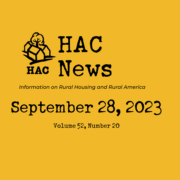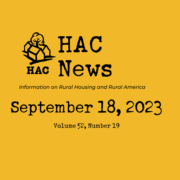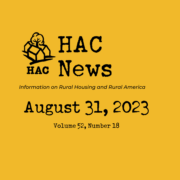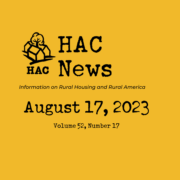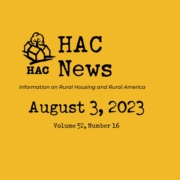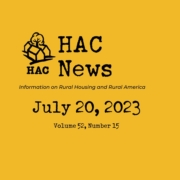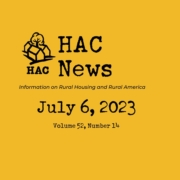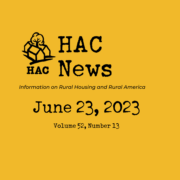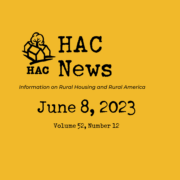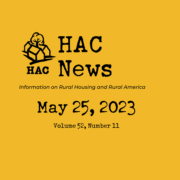HAC News: September 28, 2023
Vol. 52, No. 20
TOP STORIES
Government may shut down
As of Thursday morning, September 28, Congress has not been able to agree on a funding measure to keep the government operating beyond the end of the fiscal year on September 30. What HAC knows about the possible effects on housing assistance is explained on our website and is currently the same information we reported in the HAC News of September 18. We expect USDA RD will soon release more details about potential impacts on its rural housing programs. As we learn more, we will update the website and post notices on our Facebook and LinkedIn pages.
Shutdown would threaten flood insurance
The National Flood Insurance Program, run by FEMA, provides coverage for a large proportion of all U.S. homes with flood insurance. Its authorization will expire on September 30 unless Congress reauthorizes it in a continuing resolution or other legislation. If it lapses, contracts entered into before September 30 will remain in effect until 30 days past their renewal dates and FEMA will continue paying claims as long as it has funds available. NFIP will not be able to issue new insurance or renew existing contracts when they expire, however, and the National Association of Realtors® estimates that a lapse in NFIP authorization could threaten 1,300 property transactions per day.
RuralSTAT
No geography – central cities, urban suburbs, rural suburbs, or places outside metro areas – comes close to having enough affordable, available, and adequate housing units for renters with extremely low (below 30% of area median income) or very low (below 50% of AMI) incomes. Outside metro areas, there are only 44.2 such units for every 100 extremely low-income renters and 66.5 for every 100 very low-income renters. Source: HUD, Worst Case Housing Needs: 2023 Report to Congress.
OPPORTUNITIES
HUD opens Healthy Homes and Weatherization Cooperation Demo
Nonprofits and state, local, and Tribal governments that have active Department of Energy Weatherization Assistance Program grants or subgrants or HUD Healthy Homes Production grants are eligible for HUD’s Healthy Homes and Weatherization Cooperation Demonstration to explore the potential advantages of coordinating these home intervention services. Applications are due October 31. For more information, contact Brenda M. Reyes, HUD, 202-402-6745.
Small cities main street grants deadline is October 12
HUD’s HOPE VI Main Street Program provides grants to communities with populations under 50,000 to assist in the renovation of historic, traditional central business districts or “Main Street “ areas by replacing unused, obsolete commercial space in buildings with affordable housing units. Applicants must be local governments whose jurisdiction includes a Main Street area; nonprofits, for-profits, and others can be subcontractors. For more information, contact Susan Wilson, HUD, 202-402-4500.
Coronavirus funds can be used for disasters, transportation, and community development
Comments are due November 20 on a Treasury Department interim rule expanding allowable uses of State and Local Fiscal Recovery Funds to include disaster relief, surface transportation, and CDBG-eligible community development. For more information, contact Jessica Milano, Treasury, 844-529-9527.
Deadline extended for USDA Discrimination Financial Assistance Program
The original October 31, 2023 application deadline has been changed to January 13, 2024 for farmers, ranchers, and forest owners who experienced discrimination when seeking USDA farm loans before January 2021.
REGULATIONS AND FEDERAL AGENCIES
HUD extends NSPIRE compliance date for additional programs
HUD’s National Standards for the Physical Inspection of Real Estate (NSPIRE) final rule will take effect on October 1, 2024 rather than October 1, 2023 for the Housing Choice Voucher and Project Based Voucher programs. HUD recently made the same change for the HOME, Housing Trust Fund, Housing Opportunities for Persons With AIDS, Emergency Solution Grants, and Continuum of Care programs. For more information, contact Dana M. Kitchen, HUD, 202-708-1112.
DDAs and QCTs designated
HUD has released its 2024 lists of Difficult Development Areas and Qualified Census Tracts for the Low-Income Housing Tax Credit program. For more information, contact Michael K. Hollar, HUD, 202–402–5878.
USDA requests input on research access
USDA will hold virtual listening sessions on September 27 and October 12 on public access to the results of research funded wholly or in part by any USDA component agency. Written comments are due November 15. For more information, contact Cynthia Parr, USDA, 301-837-8917.
FHFA considers private transfer fee covenants for shared equity loans
FHFA proposes to allow Fannie Mae, Freddie Mac, and the Federal Home Loan Banks to buy and sell mortgages with certain types of private transfer fee covenants (PTFCs), which require the buyer or seller to pay a private fee when a property is sold. Currently the only PTFCs permitted are for homeowners’ associations. The revised regulation would also allow PTFCs related to resale restrictions in shared equity loan programs such as community land trusts. Comments are due November 27. For more information, contact Ted Wartell, FHFA, 202–649–3157.
EVENTS
Register for the National Rural Housing Conference
Register now to join stakeholders in the field of rural affordable housing, community development, and placemaking at the 2023 National Rural Housing Conference October 24-27 in Washington, DC. The 2023 conference theme is Build Rural – both a literal and figurative appeal to explore and provoke action to build and renew rural communities by addressing housing affordability and preservation, community infrastructure and essential facilities creation and revitalization, resident led placemaking, capacity building, and community inclusion and justice efforts.
Creative placemaking webinar scheduled
The National Endowment for the Arts is offering a free webinar on November 1 to address funding and support for creative placemaking work – how to find it, who to ask, partnerships, and most effective approaches for building local funding and decision-making support.
PUBLICATIONS AND MEDIA
Complete Worst Case Housing Needs report published
The executive summary of HUD’s 2023 Worst Case Housing Needs report, released in August, showed that worst case needs were at a record high level in 2021. The just-published full report provides additional details, including data for rural suburbs within metropolitan areas and for places outside metro areas. It also includes a new element, an examination of the intersection between worst case needs and housing overcrowding.
Disasters impacting insurance for homeowners and rental properties
Researchers and others have begun to examine climate change’s effect on the cost and availability of property insurance around the country. Recent items include The 9th National Risk Assessment: The Insurance Issue by the First Street Foundation, which estimates that millions of properties nationwide may face rising insurance rates and non-renewals due to the growing risks of wildfires, wind, and flooding. In many places the insurance industry is limiting or withdrawing coverage, leaving homeowners to rely on state-backed “insurers of last resort,” which are also raising their rates. As this homeownership cost rises, the report states, property values will fall. For rental properties, The State of Multifamily Risk Survey and Report from the National Multifamily Housing Council shows an average 26% increase in insurance premiums nationwide, with “triple-digit increases” for some. Majorities of NMHC’s survey respondents increased their deductibles to maintain insurance affordability or accepted new policy limitations reducing insurers’ exposure.
Ethnically and racially uneven investments in rural water infrastructure found
In The Ethnically and Racially Uneven Role of Water Infrastructure Spending in Rural Economic Development, researchers report their findings that, while water infrastructure investments were associated with economic development outcomes in rural communities, these investments did not counteract compounded effects of systemic racism, particularly for rural Indigenous and Hispanic communities.
Homeless data improvements recommended
Calculating Change: Future Directions for Homelessness Data Use and Reporting, a National Alliance to End Homelessness report, advocates for increased data efforts in service programming in order to identify and respond to challenges in the field. Along with recommendations to expand data collecting techniques, NAEH offers suggestions to local stakeholders and Continuums of Care struggling to navigate their Homeless Management Information Systems. At an October 11 webinar titled Calculating Change: The Continuing Conversation on Homelessness Data Reform, panelists will discuss the report and ways the field can improve its approaches to data.
Report covers adults’ recovery from substance use and mental health problems
The federal Substance Abuse and Mental Health Services Administration released Recovery from Substance Use and Mental Health Problems Among Adults in the United States, a report that provides policy recommendations and data on the 20.9 million adults in recovery from substance use disorders and 38.8 million adults in recovery from mental health problems. Policy recommendations include access to affordable, safe, and stable housing options and community support.
HAC
HAC is hiring
- The Rental Housing Development and Preservation – Housing Specialist will provide technical assistance support to nonprofit organizations involved in multifamily housing programs, with a specific focus on USDA 515 and HUD rural housing programs. This position is remote work eligible.
- The Rental Housing Development and Preservation Housing Specialist – Senior Level Position is a senior-level role that combines expertise in multifamily housing programs, specifically focusing on USDA 515 and HUD rural housing programs, with the responsibility of providing technical assistance, with a particular focus on transfers of USDA 515 properties. This position is remote work eligible.
- The Senior Accountant is responsible for applying technical and leadership skills to guide accounting practices and recording of transactions. This position is hybrid, based in Washington, DC.
- The Financial Controller is responsible for day-to-day management of HAC’s finance and accounting processes. This position is eligible for a hybrid schedule.
- The Senior Human Resources and Payroll Administrator oversees all aspects of human resources and payroll practices and processes. This position is eligible for a hybrid schedule.
- The Executive Assistant supports the work of HAC’s Chief Executive Officer, senior leadership, and board of directors. The position is a blend of administrative work and project assignments. This position is based in Washington, DC.
Need capital for your affordable housing project?
HAC’s loan fund provides low interest rate loans to support single- and multifamily affordable housing projects for low-income rural residents throughout the U.S. and territories. Capital is available for all types of affordable and mixed-income housing projects, including preservation, new development, farmworker, senior and veteran housing. HAC loan funds can be used for pre-development, site acquisition, site development, construction/rehabilitation and permanent financing. Contact HAC’s loan fund staff at hacloanfund@ruralhome.org, 202-842-8600.
Please note: HAC is not able to offer loans to individuals or families. Borrowers must be nonprofit or for-profit organizations or government entities (including tribes).
Want to reprint a HAC News item?
Please credit the HAC News and provide a link to HAC’s website. Thank you!

